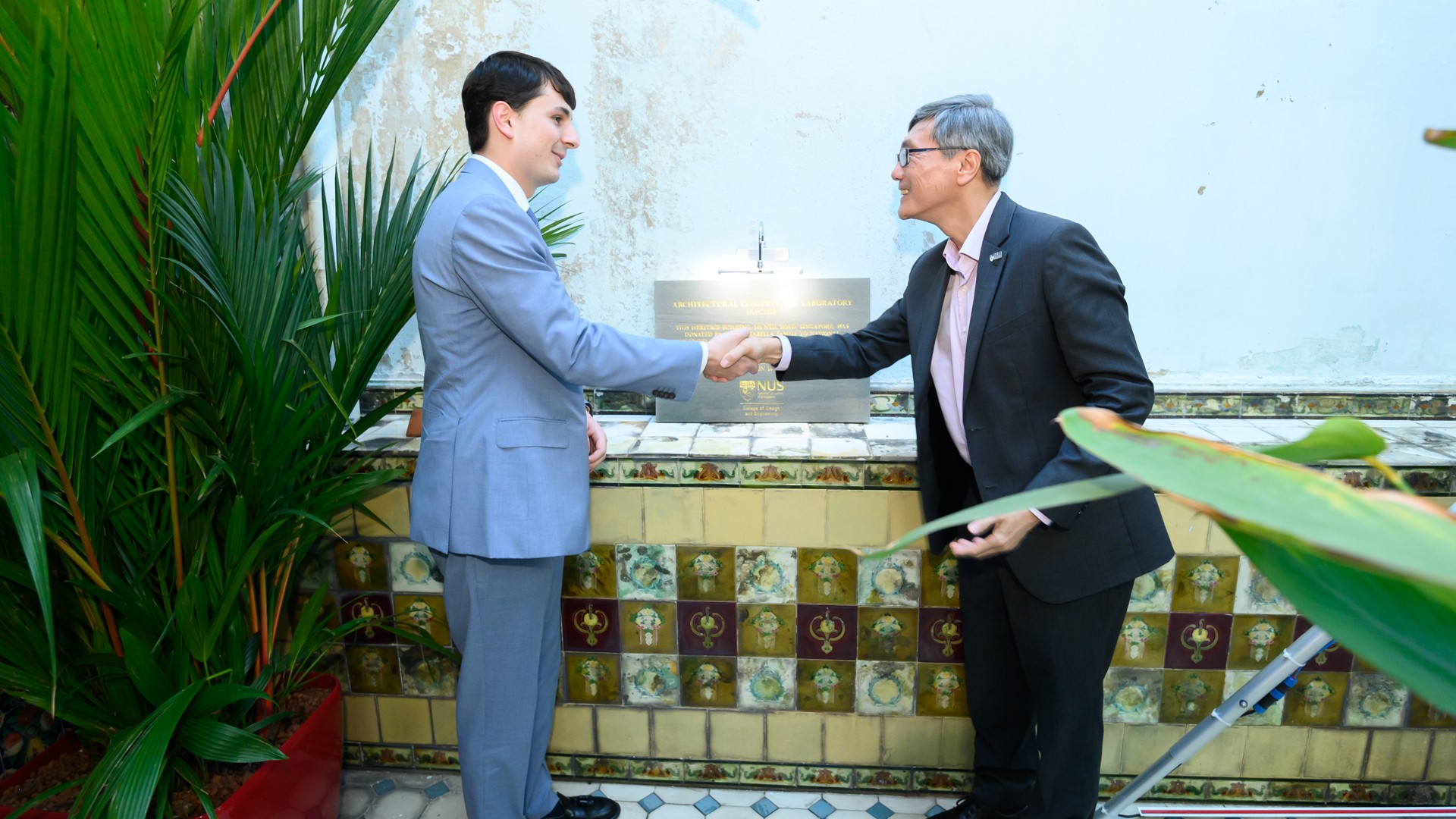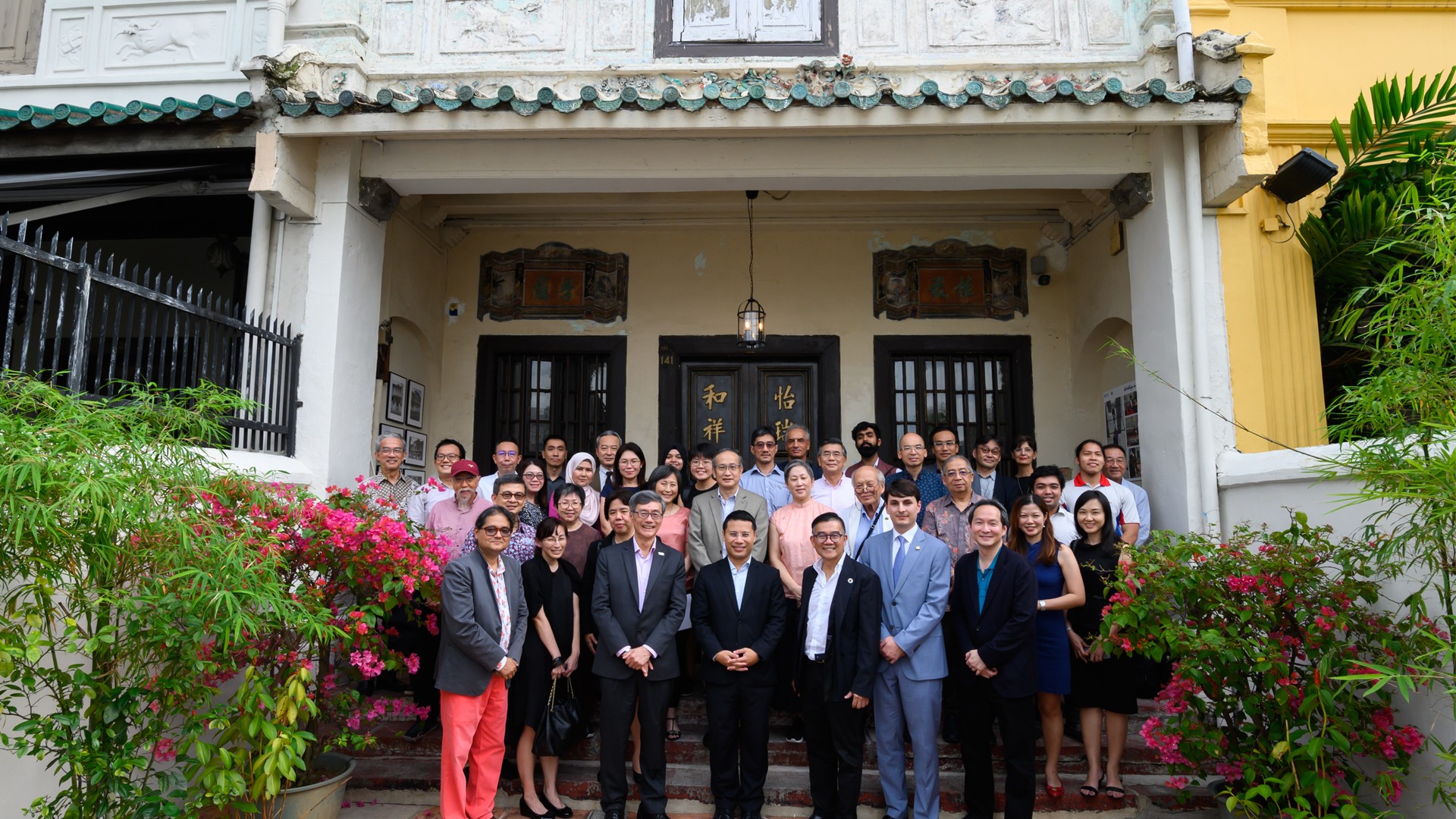NUS Architecture opens new living laboratory to advance sustainable heritage management
First of its kind in SE Asia, the ArClab will serve as a valuable case site for teaching and research into conservation practices
The Department of Architecture under the National University of Singapore College of Design and Engineering (NUS CDE) today opened the Architectural Conservation Laboratory (ArClab), a unique living laboratory housed in a conserved building which will serve as a site for researchers, graduate students and built heritage professionals to conduct a wide range of teaching and research activities on sustainable development of the built environment.
Mr Desmond Lee, Minister for National Development and Minister-in-charge of Social Services Integration, graced the opening of ArClab as the Guest-of-Honour.
ArClab was established in January 2022 to achieve four key goals: (i) augment the training capabilities of Singapore’s building industry in built heritage conservation; (ii) develop innovative use of technologies to enhance conservation; (iii) conduct high-impact research into broader conservation issues; and (iv) promote climate resilience and net-zero retrofit in historic buildings.
Over the next four to five years, ArClab will undertake the restoration of 141 Neil Road, a historic townhouse in the Blair Plain Conservation Area. The Portabella family, who owned the house, had recently donated it to the University, along with a gift of S$2 million, to support its repair and conservation works.
“We are deeply grateful to the Portabella family for their generous gift. The first of its kind in Southeast Asia, the ArClab aims to be an exemplar and pedagogical demonstration of sensitive repair and conservation, adaptive reuse of heritage, and sustainable management of the historic environment,” said Professor Ho Puay Peng, Head of the NUS Department of Architecture and UNESCO Chair on Architectural Heritage Conservation and Management in Asia.
The building’s conservation process will provide opportunities for both teaching and research. Using the conserved townhouse as a living lab, ArClab will showcase a new model for learning about the historic environment, building professional capacity to manage historical resources, and promoting historical and environmental studies.
Professor Heng Chye Kiang, Deputy Dean (Research), NUS College of Design and Engineering, added, “ArClab is a timely endeavour that brings together expertise in engineering, design and architecture from the NUS College of Design and Engineering to preserve our history and build skills to address Singapore’s unique urban sustainability concerns.”
Speaking at the opening of ArClab, Minister Lee said, “I am excited to see how ArClab will become an engine to build up knowledge of conservation practices and skills locally; develop heritage capacity building in Singapore and our region; support building owners in the maintenance and restoration of heritage buildings; grow Singapore’s overseas presence in built heritage and break new ground internationally; and see how we can imbue sustainability and livability in built heritage.”
Cultural heritage comes alive
One of the oldest building in the entire stretch of Neil Road, the historic house was built as part of the Everton Estate in the 1880s. It sits on a land area of 3,193 sq ft and has a gross floor area of 4,813 sq ft. The house resembles the first transitional typology of local townhouses, which straddles the early (the 1820s – 1900s) and late Straits periods. The rectangular-shaped plan of the house corresponds to traditional Chinese geomancy, which involves placing primary elements along the N-S axis and secondary in the transverse direction. The historic building contains a marvellous collection of decorative tiles depicting English Art Noveau and Chinese motifs. It is adorned with several auspicious Chinese character plaques in clerical and cursive font styles.
Housed within the historic building, ArClab will be a dynamic “classroom in the city” for students taking graduate programmes and doctoral studies in built heritage management. They will play a significant role in the repair and conservation works. Students will learn and conduct research on areas such as traditional building materials and craftsmanship; the use of innovative technologies for repair works, energy efficiency and comfort; and net-zero retrofit in historic buildings. ArClab will also design and deliver advanced courses for professionals working in the field of built heritage.
Research will be conducted alongside teaching activities in the conserved building. NUS researchers will carry out various projects, including conducting research, documentation and restoration of Singapore’s heritage using innovative technologies such as 3D modelling; developing an integrated approach for energy efficiency and net-zero retrofit of Singapore’s historic buildings; testing and developing traditional building materials and techniques as well as using innovative technologies for conservation and repair works in the Singapore context; and estimating the impact of the high-density urban surroundings on the microclimate of historic districts.
A broad range of advanced equipment will be available for researchers and students to conduct holistic research and training.
Cultivating heritage awareness and appreciation
To help promote a better understanding and appreciation of historic buildings and the work involved in their repair, the historic building will be open to the public during and after the conservation works are completed by 2027. ArClab plans to welcome visitors in early 2023, and heritage buffs can enjoy a specially curated exhibition titled “Heritage in Motion” showcasing the evolution of the house and the neighbourhood as well as a guided tour of the ground floor of the house.
Prof Ho said, “ArClab will serve as a unique resource for NUS students and researchers, industry professionals, and the general public while enabling cutting-edge cross-disciplinary research and collaboration across the fields of digital conservation technology, material sciences, building aesthetics, and environmental sustainability.”
“Beyond providing opportunities to learn and research, I hope that ArClab can kickstart more conversations on the future of the built and cultural heritage in Singapore. Above all, we want to foster appreciation for our built heritage among the public and potentially even inspire future leaders in this area. So that we continue to have conserved and heritage buildings that current and future generations of Singaporeans can love and cherish,” commented Minister Lee.
For more information about ArClab, please visit: https://www.arclabnus.com/





